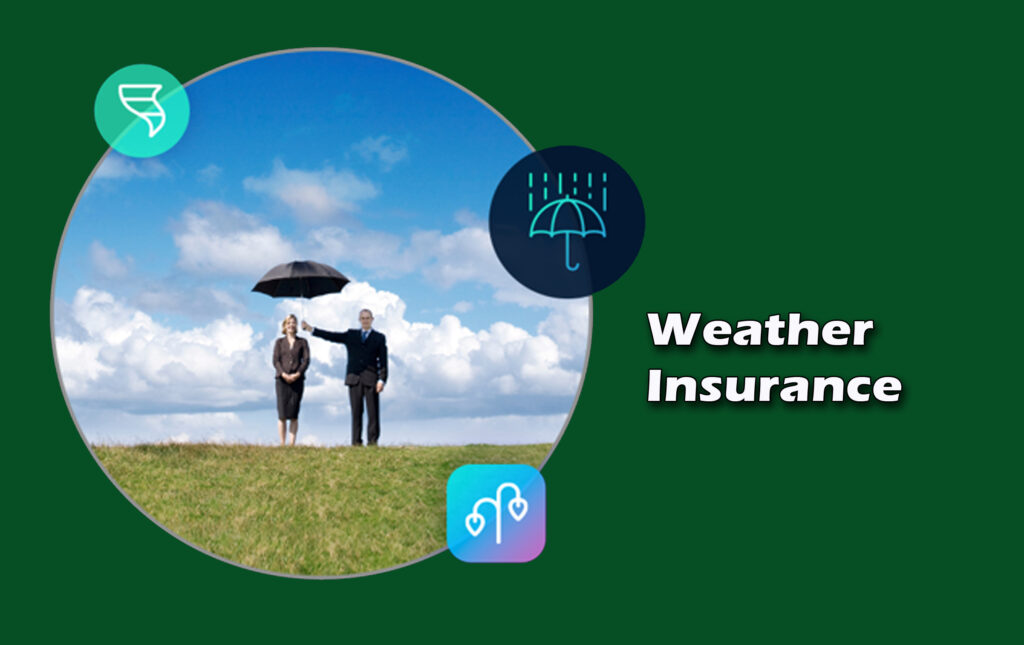What is weather insurance? Weather is one of the most unpredictable elements in life and can have a significant financial impact on various industries, events, and businesses.

Whether it’s a sudden downpour during an outdoor wedding, a hurricane damaging crops, or excessive heat ruining an outdoor concert, weather-related disruptions can result in substantial financial losses.
Furthermore, weather insurance is not your typical auto or home insurance policy. Instead, it’s a specialized coverage product that provides financial protection when specific weather conditions occur.
From farmers and event organizers to construction companies and tourism businesses, a growing number of people and organizations are turning to weather insurance to mitigate risks and maintain financial stability when nature takes a wrong turn.
What Is Weather Insurance and How Does It Work?
While not commonly heard of, the Weather insurance is a financial product designed to compensate the insured if specific weather conditions occur within a set time frame and geographic location.
Unlike traditional insurance, which pays out based on damages or losses incurred, weather insurance is parametric. This means that the payout is triggered automatically when some pre-agreed weather conditions, like temperature, rainfall, wind speed, or snowfall, are met, regardless of actual damages.
Here’s how the Weather Insurance generally works:
- The policyholder selects the weather parameter to insure against (e.g., more than 2 inches of rain, temperatures above 100°F).
- The policy outlines a specific time frame and location for which the coverage is active, such as during an outdoor event or a farming season.
- A third-party weather data provider monitors the weather. If the defined conditions occur, the claim is validated automatically.
- Once it has all been validated, a pre-determined payout amount is issued to the policyholder to compensate for the disruption or loss.
This straightforward, data-driven model offers a hassle-free way to manage weather risks without lengthy damage assessments or disputes.
Who Needs Weather Insurance?
Weather insurance is useful across a broad range of industries, not just agriculture or event planning. If your business or activity is weather-dependent, this form of insurance can be a vital risk management tool.
Some of the common beneficiaries of this insurance model includes:
Event Organizers
Outdoor weddings, festivals, concerts, and sporting events can be canceled or suffer financial loss due to bad weather. Hence, the weather insurance ensures these events are not total financial disasters if rain or storms interfere.
Construction Companies
Weather delays can throw construction timelines off schedule, leading to penalties and increased costs. This insurance helps in mitigating those losses.
Tourism And Hospitality Businesses
Resorts, amusement parks, and other outdoor attractions often rely on good weather to attract visitors. A rainy season can reduce the business’ revenue, which is where weather insurance comes in.
Farmers And Agricultural Businesses
Weather has a direct impact on crop yield and livestock health. This insurance can cover excessive rainfall, drought, or freezing temperatures to help stabilize farm income.
Types Of Weather Insurance Policies
There are several types of weather insurance policies to choose from, but it all depends on the nature of the risk and the business.
Here’s a breakdown of the most common types:
- Rain Insurance: Covers losses if rainfall exceeds a specified amount during a scheduled event or time period.
- Snow Insurance: Useful for cities, ski resorts, or snow removal companies if snowfall deviates from expected norms.
- Temperature Insurance: This insurance model applies when temperatures exceed or drop below a certain level. What’s more, it is useful for energy companies, festivals, and retail businesses.
- Wind Insurance: Protects against high winds that can lead to event cancellations or damage to structures.
- Drought Insurance: This is primarily for farmers and the policy pays out if rainfall is insufficient for crop growth over a specific period.
Each policy is customizable, and premiums are based on historical weather data, the insured amount, the likelihood of occurrence, and the duration of the coverage period.
Benefits Of Weather Insurance
Here are some of the reasons why more and more people are opting in for this insurance model:
- Because it’s parametric, claims are paid quickly once the weather trigger is met.
- The policies are tailored to your business, event, or season.
- It offers budget certainty by minimizing the impact of weather variability.
- You don’t have to show financial loss; just that the weather conditions that occurred.
Frequently Asked Questions
Is Weather Insurance The Same As Crop Insurance?
No, it isn’t. The Crop insurance covers actual losses to crops, often requiring field inspections and proof of loss. Weather insurance is simply broader and parametric, paying out based on specific weather triggers regardless of the crop outcome.
How Much Does Weather Insurance Cost?
The cost varies depending on the risk level, event location, time of year, and the weather condition being insured. Also, the premiums are usually higher for events during unpredictable seasons.
How Long Does It Take To Receive A Payout?
Since the claims process is automatic once a trigger is confirmed, payouts are typically made within days of the event or insured period.



